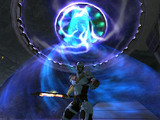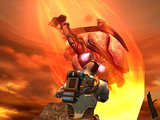Starr Long Interview - Part 1

Richard Garriott and Starr Long answered our questions about their new MMORPG, Tabula Rasa, in two exclusive interviews.
JeuxOnLine: You're mainly known with Richard Garriott for your medieval Ultima series. With the exception of some old games like Bioforge and the very first Ultima games, almost all your games have been set in a medieval fantastic universe. Tabula Rasa is definitely a radical change.
Was creating a new sci-fi game something you wanted do to for a long time? Or were you just tired of the medieval games? When did you begin to think about making Tabula Rasa and what were your inspirations?

Starr Long: That's a great question. You know, I've worked with Richard as his partner for about 15 years now. And so, I've been through most of this transition and almost everything we've done until today was medieval fantasy.
If you look at the first three Ultimas, Richard added a little some science-fiction in there. There was some time-travel, and there was like a space shuttle and then there was a laser pistol. One of the original inspirations for the very first Ultimas was actually Time Bandits. So there is some elements of that in there, but then starting with Ultima 4, he went very straight medieval-fantasy. His main inspiration was JRR Tolkien. And then he did that's for about twenty years. And my experience was also confined almost exclusively to Ultimas, and you know I was the project director for Ultima Online.
When we finished Ultima Online, we all talked about how we really wanted to do something with a more science-fiction direction to it, because we thought like we had explored medieval fantasy as far as we'd go, at least from a single player perspective. Ultima IX pretty much was the conclusion of the story arc for the Ultima series and we wanted to move on to something different and we thought like Ultima Online was going to be around forever.
So versus work on a follow-up to that, we thought that we should continue to expand that and let's work on some sort of science-fiction type title. We've talked about doing Privateer Online, or Wing Commander Online, or something along that line. But instead we started Ultima Online 2 and then we parted ways with Electronic Arts and we came over to NCsoft.
And again we wanted to take a not do straight medieval-fantasy, we wanted to still have some fantastic elements of the game but we wanted to move in more of a science-fiction direction.
The inspiration for the game varies a lot. From a gameplay perspective we were inspired by great movies and games about war time and what it was like to be in the middle of a war and so that inspired us to create a game space that had NPCs fighting each others all the time, versus just sort of standing around in places waiting for you to have to kill them.
And so, why we went science-fiction versus medieval-fantasy ? Again, there was some fact of just kind of being tired but it was also wanting a new challenge. We've felt like we had done what we wanted to do with medieval-fantasy and we felt like we could be more creative and more free and at the same time be more challenged if we did science-fiction which wasn't something we had as much experience with, although we're all huge science-fiction fans, so from a entertainment perspective it was always something that was part of our life, but just from a game creator stand-point it was something new for us.
JOL: Tabula Rasa is a fast-paced action game. The core of the game is to fight against the Bane. Your previous MMO, Ultima Online, is known for being far more than just a monster-bashing game. The players can create their house, decorate it, build cities, make clothes, create their own shop, play theater, play chess, go fishing and many many many others things.
Except fighting the Bane and doing quests, what will Tabula Rasa offer to the players?

S.L.: That's another great question. If you look at the history of the last ten years of massively multi-player games, there's basically two main directions the genre has taken.
There's what we call the virtual world simulation also nick-named the sand-box. Ultima Online is pretty much the ultimate expression of that, creating basically a set of walls and a simulation of a world and then kind of letting players go in any directions that want. Others games in that genre [inaudible] like Star Wars Galaxies for instance.
And there's the other direction that was pioneer by say EverQuest, which is the very level-based, item-oriented, achievement-oriented kind of progression. Lineage and Lineage 2 are also oriented in that way. And that's where lot of virtual world simulations are more sort of guided experience and more defined experience where you get experience points and go up in level and there's a lot of numbers involved and things like that. World of Warcraft and Guild Wars and others games like that are also examples of that kind of games... The main focuses of those games are also about fighting and leveling up and collecting things.
Both of those basic directions had their success and Tabula Rasa is definitely focusing more on the direction of Guild Wars and Lineage and other games like that... It is about you versus the environment and fighting other players and it's mainly focused on fighting. However we do have other activities that the players can participate in that are not necessarily just fighting.
It's not as much of a virtual world as something like Ultima because that's not our focus but there are aspects of it that are very similar to Ultima for instance. One of the things of the virtual world simulations is that things in the world interact with each others and that the environment is also very interactive with the players, and that's something we're pushing really hard in Tabula Rasa.
In most of the games like WoW and EverQuest, if you look at the game world, it's very static, it doesn't change very much and when you go in any given area it's pretty much always the same and the NPCs are just sort of standing around, they're not really doing anything. In our game, we wanted a much more dynamic environment. So, the NPCs are actually interacting with each others and the players. They aren't just standing there waiting for things to happen with the players. They actually fight each others for instance and that goes for everything from the native creatures of any given planet.
There are prey creatures and there are predator creatures, so you could wander to the post and you could see predators preying on prey animals without your interaction at all. More exciting and intriguing is that the good army and the bad army of creatures are constantly fighting each others and they aren't just standing in place. Troop ships would swoop in and drop off troops and these troops would go on patrol and then they could encounter patrols of others NPCs and they would fight it out. And believe it or not, more than that, they will actually fight over key areas of territory on the map called control points, and those control points are linked to variables in the environment, things like : what teleporters are available to the players, where they could resurrect when they die that are available to the players, what missions are available to the players, what shopkeepers are available...
And so the environment is a lot more dynamic and in that sense is it very much a world simulation so you may get in to the game, you may go get some missions from some NPC in a military base and then you go up and complete those missions and you come back and that base could have been overrun and so to be able to get those NPCs back for you to turn your missions in, you have to organize with other players to take back that base.
There's another aspect that's still fighting oriented but it also get a virtual world take to it. The other thing is that we're trying to tell the stories in a much more detailed ways than most online games out. In fact that's how we are using our instance spaces. In most games, it's all about just going around and killing things and even the instance spaces are really just private areas for you to kill things. It's just for the game developers to make sure that there is enough loot going around and you're not competing with other players in these spaces for the items in there. But in our game, the instance spaces are really used to tell very detailed sequenced stories that you would find more in single-player role-player game, where you go through a series of really interesting activities like getting access codes NPCs known, entering those in computer monitors so you can disable security systems or open up teleporters to beam in reinforcement or free prisoners and escort them through the base and take them outside or learn about how this guy family has been kidnapped and you have to rescue them.
Also like ethical parables much like in Ultima IV – Richard sorts of pioneer that with the Virtue things – we actually tell this sort of ethical parables where instead of most games where you get a mission it's kind of black and white. It's just one thing, you just do whatever the mission says. In our game, there are some missions which are a little more subtle than that. And just from a strictly game feature stand-point we do have a very robust crafting system where players will be able to create armors and weapons or enhance existing armors and weapons and trade those with others players so there's going to be a pretty robust economy and a crafting system that players can participate in. They won't be able to open up their own shop like in Ultima but they will definitely be able to create things and share those with the other players.
JOL: And will they be able to have houses they can arrange and decorate? I heard in the first incarnation of Tabula Rasa - before the revamp of few years ago - it was planned for players to have houses, but I have not heard about a lot that recently. What's the plan now?

S.L.: Right now we're not shipping with player housing. The original incarnation of Tabula Rasa had instanced player housing, where the housing wasn't in the environment, in the game world. And we thought that whatever benefits to the players that we would get out from that were not equal to the efforts and so we decided to focus on other features. So we won't be shipping with player housing.
JOL: In Tabula Rasa, players have to unite against a xenophobic murderous alien race, the Bane, to save Earth. The principle of the game makes it a collaborative one, where everyone has to fight against the computer, rather than a competitive one, where players would have to fight each others.
I read that, in order to support PvP in Tabula Rasa, you plan to implement human clan wars rather than, for example, allowing players to incarnate some sort of Bane.
Don't you think the idea of a kind of human civil wars when humans are supposed to unite against the Bane seems somewhat in contradiction with the background story of the game? It's quite hard for example to imagine a whole PvP server where all the humans would be killing each others, letting the Bane destroy Earth during this time.

S.L.: That's a great question and I'm always kind of amused by this question because it implies a wonderful optimism about human nature. The assumption of that statement is that humans are basically nice people and that when presented with a threat we will all unite with each other and all be in unison to fight whatever threat that comes toward us. But I can point to countless examples in history where quite the opposite is true.
While humans can be wonderful and cooperate with each other, and for the most part the fiction supports that in that we are uniting and not even just uniting amongst ourselves but uniting with other sentient species from other planets to fight the bad guys.
However, there will always be factions within that, just like there are political parties within any given country that will continue to fight each others despise the fact that the country might be at war with another country. It's the same sort of idea here where even though we're all united fighting the bad guys, there are factions within that that may not necessarily get along with each other.
And in the future societies where we have cloning technology, we have resurrection technology where you don't ever actually die, the military structure feels like - and this is the game part of the story - things like clan versus clan warfares are actually pressure release valves if you will, where the fighting forces can some tensions out they may have with each other in basically an armless way, and it's kind of the ultimate training exercise where they would be fighting with each others. So while they don't officially endorse it, in the fiction, they politely look the other way.
It's like a boxing match , there are some great fictional examples of that. If you look at the Battlestar Galactica TV series - they do a great job - it's a similar story where humanity is near extinction but they still fight amongst themselves, they still kill each other, they still box, they still fight.
So I can see how on the surface it might appear contradictory but actually we feel it fits very nicely with the fiction and ties in to some of the sciences behind it. And again it touches on the complexity of the human nature.
JOL: Will every game server of Tabula Rasa have its own state of story advancement? I mean, will the state of the war against the Bane be truly different for each server? Can we imagine some servers doing a lot better than others, with areas totally free of the Bane and prosperous while the same areas on other servers would be totally devastated? Or, will some monsters and quests be only available on servers who advanced far enough into the story?

S.L.: That's a great question. The way we sort of just broken it up is that the instance spaces are the places where the players will see and feel progression the most and feel like they're progressing through a storyline. In the share spaces it's more of a constantly variable space versus a steady progression.
Parts of what you theorize are actually true in the sense that it's possible on one server that players are a lot more organized and so they are able to take a whole control point longer and therefore have those mission NPCs be available to other players and the way the creatures are responding be adjusted based on that, in a different way that on another server where the player are a little less organized so the Bane overrun control points more often.
But in either one of them, the game is programmed to sort of constantly vary its state and so even though players might be able to take and hold a control point for a while it would be pretty much impossible for them to hold it indefinitely ; wave after wave after wave, the bad guys will continue to try to take that control point until they can.
There will be some differences from server to server based on the organization level of the players but it isn't so much, they will never be a case where they exterminate all the Bane on the map because the will just keep sending in reinforcements and though it will be variable each time and it might vary based on player organization but it won't ever be : this server is [inaudible] when this one isn't.
JOL: And about content unlocking? Will players be able to unlock contents on some servers and not on others?
S.L.: Yes, that's also not exactly... there are... actually that's a really great question but I really shouldn't talk about it right now.
Réactions (21)
Afficher sur le forumPas de compte JeuxOnLine ?
Créer un compte| Plateformes | Windows |
|---|---|
| Genres | Action, jeu de rôle (rpg), MMO, MMORPG, stratégie, tir, fantasy, futuriste / science-fiction, post-apocalyptique |
| Bêta fermée |
2 mai 2007 |
| Bêta ouverte |
2007 |
| Sortie |
2 novembre 2007 |
| Arrêt |
28 février 2009 |
Que pensiez-vous de Tabula Rasa ?
-
7 juin 2013
-
13 décembre 2011
-
26 octobre 2011
-
31 mai 2009
-
1 mars 2009
